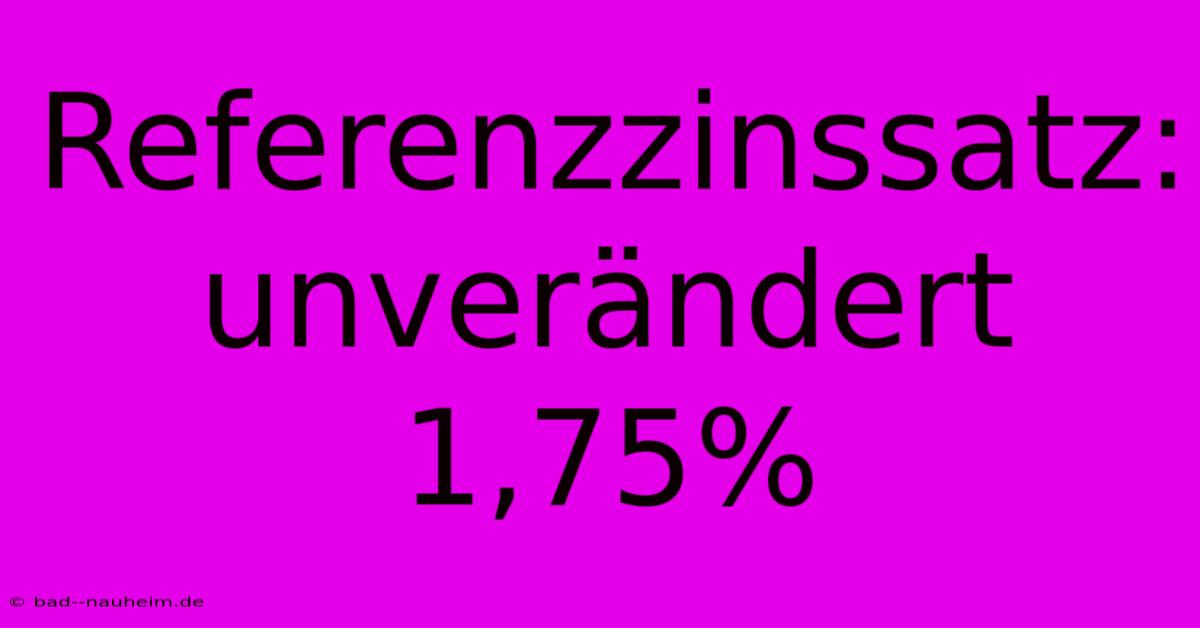Referenzzinssatz: Unverändert 1,75%

Discover more detailed and exciting information on our website. Click the link below to start your adventure: Visit Best Website Referenzzinssatz: Unverändert 1,75%. Don't miss out!
Table of Contents
Referenzzinssatz: Unverändert 1,75% – Was bedeutet das für Sie?
Hey Leute,
Let's talk about something that impacts us all, even if we don't always realize it: the Referenzzinssatz. Recently, it stayed put at 1.75%, and I know, boring, right? But trust me, this little number has a huge effect on our everyday lives. I’ll explain why, and share a bit of my own financial journey, which, let’s just say, hasn’t always been smooth sailing.
My First Foray into Finance (and My Epic Fail)
Years ago, I was convinced I was a financial whiz. I'd read a few articles—okay, maybe skimmed a few—about interest rates and thought I had it all figured out. I decided to take out a loan, thinking, "1.75%, psh, that's practically nothing!" I didn’t fully grasp the compounding effect of interest, especially how small changes in the base rate affect the total cost of credit over time. Long story short? I ended up paying way more than I anticipated. Major ouch! That's when I learned the hard way: Don't underestimate the power of even a seemingly small Referenzzinssatz.
Lesson learned? Do your homework! Don’t just think you understand; really understand the implications before signing on the dotted line for any kind of loan.
What Does a Stable Referenzzinssatz of 1.75% Mean?
So, what's the big deal about the Referenzzinssatz staying at 1.75%? Well, it’s a benchmark. Many other interest rates, like those for mortgages, savings accounts, and loans, are based on or influenced by this rate. A stable Referenzzinssatz generally suggests economic stability (at least, that's the hope!). It means banks aren't frantically raising or lowering rates to combat inflation or economic uncertainty.
However, this stability isn't necessarily a guaranteed win for everyone. For those with savings accounts, a 1.75% Referenzzinssatz might not translate into amazing returns. Inflation could still eat away at your savings. It's a complex picture!
What to do with this info?
Here are some practical tips based on my hard-won experience:
- Understand your own financial situation: Before making any major financial decisions, take a long hard look at your income, expenses, and debt. Know your stuff.
- Shop around for the best deals: Don't settle for the first loan or savings account you see. Compare rates and terms from different banks and financial institutions. You'd be surprised by the difference!
- Consider inflation: Remember inflation eats into your savings and loan repayments. Make sure to account for it.
- Seek professional advice: If you are overwhelmed or unsure, don't hesitate to consult a financial advisor. This isn't a sign of weakness; it's smart!
It’s also a good time to re-evaluate your budget. If the 1.75% Referenzzinssatz influences your existing loans or savings plans, consider ways to optimize them.
The Bottom Line
The Referenzzinssatz remaining at 1.75% isn't necessarily good or bad news. It depends on your individual circumstances and financial goals. My biggest takeaway is that a little bit of knowledge can save you a whole lot of trouble (and money!). Stay informed, and don't be afraid to ask questions! It's your money, after all. And speaking of money, I'm off to budget mine! Talk soon!

Thank you for visiting our website wich cover about Referenzzinssatz: Unverändert 1,75%. We hope the information provided has been useful to you. Feel free to contact us if you have any questions or need further assistance. See you next time and dont miss to bookmark.
Featured Posts
-
Radprofi Evenepoel Opfer Von Dooring Unfall
Dec 03, 2024
-
Olympia Crash Postauto Kollision
Dec 03, 2024
-
Morgane 13 Vermisst Selbstverletzungsspuren
Dec 03, 2024
-
Didier Castella Ein Glas Zu Viel
Dec 03, 2024
-
Nach Kushner Trump Setzt Auf Boulos
Dec 03, 2024
